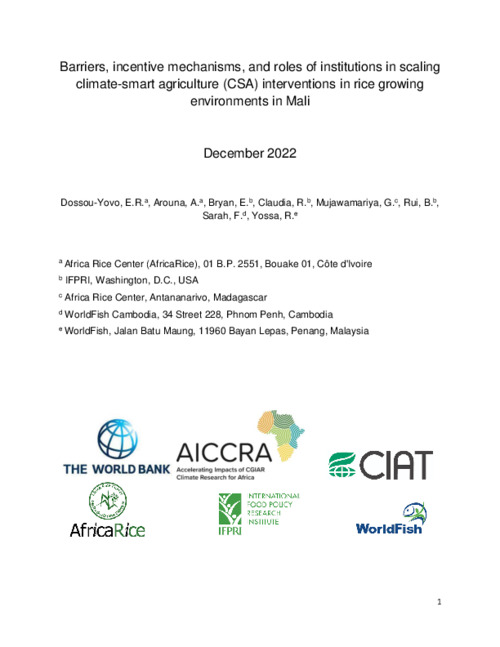Please use this identifier to cite or link to this item:
https://hdl.handle.net/20.500.12348/5511
Barriers, incentive mechanisms, and roles of institutions in scaling climate-smart agriculture (CSA) interventions in rice growing environments in Mali
| dc.creator | Dossou-Yovo, E. | en_US |
| dc.creator | Arouna, A. | en_US |
| dc.creator | Bryan, E. | en_US |
| dc.creator | Ringler, C. | en_US |
| dc.creator | Mujawamariya, G. | en_US |
| dc.creator | Benfica, R. | en_US |
| dc.creator | Freed, S. | en_US |
| dc.creator | Yossa, R. | en_US |
| dc.date.accessioned | 2023-06-09T07:43:19Z | |
| dc.date.available | 2023-06-09T07:43:19Z | |
| dc.date.issued | 2022 | en_US |
| dc.identifier.citation | Elliott Ronald Dossou-Yovo, Aminou Arouna, Elizabeth Bryan, Claudia Ringler, Gaudiose Mujawamariya, Rui Benfica, Sarah Freed, Rodrigue Yossa. (30/12/2022). Barriers, incentive mechanisms, and roles of institutions in scaling climate-smart agriculture (CSA) interventions in rice growing environments in Mali. Zambia: AICCRA. | en_US |
| dc.identifier.uri | https://hdl.handle.net/20.500.12348/5511 | |
| dc.description.abstract | Climate change has many facets, including changes in long-term trends in temperature and rainfall regimes, increased year-to-year variability, and frequency of extreme events. Agriculture is the most affected, particularly in Sahelian countries, due to a scarcity of productive resources. Transitioning towards more resilient food systems requires the adoption of climate-smart agriculture (CSA) interventions. This study uses a participatory framework that provides ample space for local stakeholders to integrate their knowledge and experience in the assessment of the barriers, incentives mechanisms, and roles of institutions for scaling out locally relevant CSA interventions. The framework was applied to the four rice-growing environments in Mali, a Sahelian landlocked country, that provides 11% of the rice production of the West African region. The results showed that the adoption levels of the CSA interventions were low. The barriers to large-scale adoption of CSA interventions were specific to the rice growing environments and interventions, but overall included the lack of funding, equipment, capacity, and cost for implementation, insufficient fertilizer, quality seeds, and low farmers' awareness of the benefits of the interventions. Stakeholders emphasized the importance of subsidies, capacity building, and access to extension services as essential incentive mechanisms, and governments, farmers' organizations, women's organizations, youth organizations, and research and academic institutions as key players for scaling CSA interventions at the local level. The framework provides a decision-making tool for investment in CSA intervention scaling. | en_US |
| dc.format | en_US | |
| dc.language | en | en_US |
| dc.publisher | AICCRA | en_US |
| dc.rights | No known copyright restrictions | en_US |
| dc.subject | scaling | en_US |
| dc.title | Barriers, incentive mechanisms, and roles of institutions in scaling climate-smart agriculture (CSA) interventions in rice growing environments in Mali | en_US |
| dc.type | Internal Report | en_US |
| cg.contributor.funder | The World Bank | en_US |
| cg.coverage.country | Mali | en_US |
| cg.coverage.region | Western Africa | en_US |
| cg.subject.agrovoc | agriculture | en_US |
| cg.subject.agrovoc | adaptation | en_US |
| cg.subject.agrovoc | stakeholders | en_US |
| cg.subject.agrovoc | rice | en_US |
| cg.subject.agrovoc | climate-smart agriculture | en_US |
| cg.contributor.affiliation | International Center for Tropical Agriculture | en_US |
| cg.contributor.affiliation | International Food Policy Research Institute | en_US |
| cg.contributor.affiliation | Africa Rice Center | en_US |
| cg.contributor.affiliation | WorldFish | en_US |
| cg.identifier.status | Open access | en_US |
| cg.contribution.worldfishauthor | Freed, S. | en_US |
| cg.contribution.worldfishauthor | Yossa, R. | en_US |
| cg.description.theme | Climate Change | en_US |
| cg.creator.id | Rui Benfica: 0000-0003-2631-107X | en_US |
| cg.creator.id | Sarah Freed: 0000-0001-8574-8218 | en_US |
| cg.creator.id | Rodrigue Yossa: 0000-0003-4792-0173 | en_US |
Files in this item
This item appears in the following Collection(s)
-
Climate Change [204]
